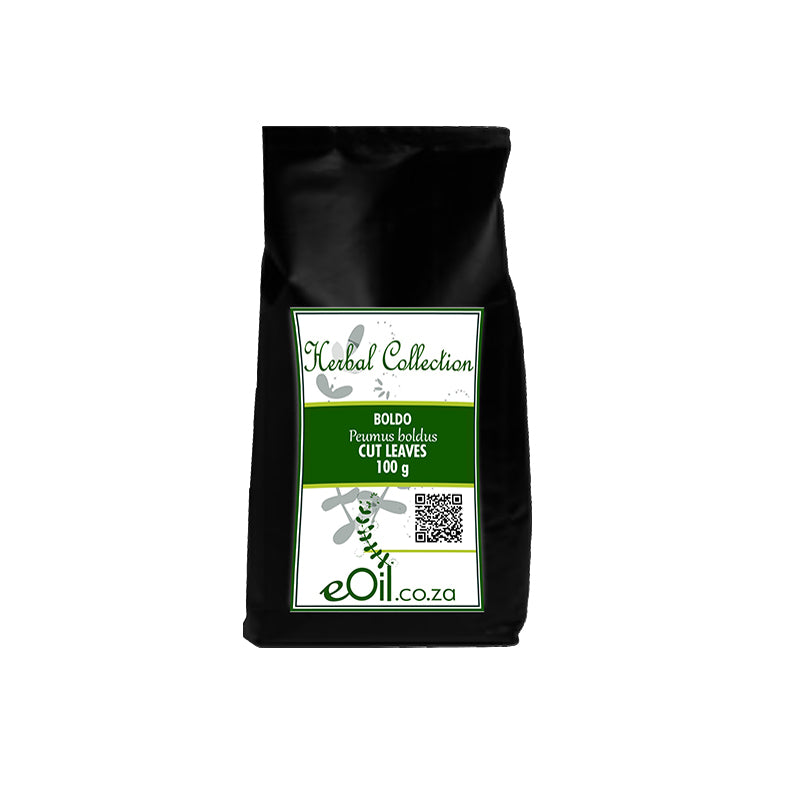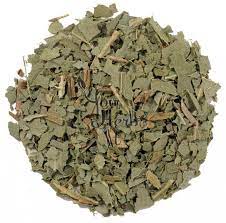Boldo Leaf Cut - Herbal collection
Boldo Leaf Cut - Herbal collection - 100 GR is backordered and will ship as soon as it is back in stock.
Description
Description
Discover the renowned South American secret for a healthy liver.
Boldo is a powerful cholagogue, meaning it actively stimulates the production and flow of bile. This makes it unmatched for aiding the digestion of fats and supporting the liver's natural detoxification pathways.
Key Benefits & Uses:
The #1 Herb for Gallbladder & Liver Support: This is its primary medicinal use. By stimulating bile flow, Boldo helps to flush the gallbladder and support the liver, acting as a powerful natural detox tonic.
Digesting Heavy, Fatty Meals: Because bile is required to break down fat, Boldo tea is the perfect after-dinner drink following a heavy, rich, or greasy meal. It helps prevent that feeling of sluggishness and nausea.
Relieves Indigestion & Gas: It is a strong carminative and antispasmodic. It is traditionally used to soothe the stomach, relieve abdominal cramps, colics, and reduce gas and bloating.
Urinary Antiseptic: In addition to digestion, it acts as a mild diuretic and antiseptic for the urinary tract.
How to Use:
Infusion (Tea): Steep 1 teaspoon of dried leaves in a cup of hot water for 10 minutes. Strain and drink. (The taste is distinct: medicinal, camphor-like, and slightly bitter).
Important Cautions:
Gallstones: Do NOT use if you have gallstones or a bile duct obstruction (stimulating the gallbladder can trigger a painful attack).
Pregnancy: Do NOT use during pregnancy or breastfeeding.
Short-Term Use: Do not use continuously for more than 4 weeks.
USES AND PROPERTIES
Boldo (Peumus boldus) is an evergreen tree native to the central regions of Chile and parts of Peru.
Its leaves have been used traditionally in South American herbal medicine for various health concerns.
some of the most commonly reported benefits, properties, and traditional uses of boldo leaves include:
- Digestive health: Boldo leaves have been used to promote healthy digestion, relieve indigestion, and alleviate symptoms of gastrointestinal issues such as bloating, gas, and constipation.
- Liver health: Boldo leaves are thought to have hepatoprotective effects, potentially helping to detoxify and protect the liver from damage.
- Gallbladder function: Boldo is traditionally used to stimulate bile production and promote healthy gallbladder function, which can aid in digestion and help prevent gallstones.
- Diuretic properties: Boldo leaves have diuretic properties, which may help to flush excess fluids from the body and reduce fluid retention.
- Antioxidant activity: Boldo leaves contain compounds with antioxidant properties, which can help protect cells from oxidative stress and may contribute to overall health.
- Anti-inflammatory and analgesic effects: Some studies suggest that boldo leaves may have anti-inflammatory and analgesic properties, which could be helpful in managing pain and inflammation.
- Mild sedative effects: Boldo leaves have been traditionally used to promote relaxation and alleviate anxiety, as they may have mild sedative properties.
- Antimicrobial properties: Boldo leaves have been found to possess antimicrobial properties, potentially offering some protection against certain bacteria and fungi.
It is essential to note that boldo leaves should be used with caution, as they contain alkaloids that can be toxic in high doses. Always consult a healthcare professional before using boldo or any other herbal supplements, especially if you are pregnant, nursing, or taking medications.
INDICATIONS
Part used Dried leaves
Traditionally used for Choleretic, Mild diuretic, stomachich, mild sedative.
DOSAGE
Make a tisane with one to two grams of chopped leaf
Drink 2 to 3 times a day
EFFECTS
Bodline stimulates the production of bile and is also a mild diuretic.
INFORMATION
Source : http://www.wikiphyto.org/wiki/Boldo
Reference on http://www.wikiphyto.org
Translation in English by Google Translate (go to the page of the source linked | on Chrome cellphones go on the 3 dots on the top right and select translate in your preferred language | on laptop right click your mouse and select option translate when hoovering on the page
plant name
Boldo, Boldu
International Latin denomination
Peumus boldus Mol. (= Peumus boldo )
botanical family
Monimiaceae
Description and habitat
- Small evergreen tree strictly localized in the part of Chile that enjoys a Mediterranean type climate
- Dioecious species
- Leaves with greyish-green, oval, hard and brittle blades, edges slightly rolled towards the underside
- Grainy and rough to the touch
History and tradition
- The aromatic character of the crumpled leaves is reminiscent of lemon balm and mint
Parts used
- dried leaf
Dosage forms available
Usual dosages
- Infusion 2.5 to 5 grams
Composition
Main components of the plant
- Essential oil (minimum 2%) with monoterpene compounds: limonene , beta-pinene , paracymene , linalool , 1.8 cineole , camphor , ascaridole
- Aporphinoid alkaloids (derived from aporphine ): majority boldine , isoboldine , isocorydine , norisocorydine , laurotetanine , laurolitsine
- Flavonol glycosides (derivatives of rhamnetol , isorhamnetol , kaempferol )
- Catechins
Main components of buds or young shoots
Main components of essential oil
- Monoterpene compounds: limonene , beta-pinene , paracymene , linalool , 1,8 cineole , camphor , ascaridole
Properties
Plant properties
- Choleretic, increases bile secretion (? Fleurentin did not find it)
- Hepatoprotective, inhibition of lipid peroxidation [1] , protects liver against toxic effects of carbon tetrachloride [2] , protects against cisplatin toxicity [3] , liver damage produced by tert-butyl hydroperoxide [4 ] , stimulates glutathione S-transferase activity [5]
- Anti-atherosclerotic, protects the vascular endothelium ( boldine ) [6]
- Anti-inflammatory, boldine protects biological systems against the peroxidizing action of free radicals [7] , it is anti-inflammatory and antipyretic [8]
- Antispasmodic [9] , relaxing effect on smooth muscle by anticholinergic mechanism
- Antioxidant [10]
- Hematological cytoprotection [11]
- Neuroprotective [12]
- Selectivity of boldine and its derivatives ( glaucine , predicentrin ) on alpha 1A adrenoceptors [13]
- Dewormer
Bud properties
Properties of essential oil
Directions
Indications of the whole plant (phytotherapy)
- Biliary insufficiency
- Cholecystopathies
- Spasms of smooth muscles (alpha 1A adrenoceptors)
- Prostate problems?
Indications of the bud (gemmotherapy)
Specific indications of essential oil (aromatherapy)
Known or suspected mode of action
- Anticholinergic, parasympatholytic mechanism
- Inhibition of lipid peroxidation
- Selectivity of boldine and its derivatives ( glaucine , predicentrine ) on alpha 1A adrenoceptors
Usual formulations
Regulations
- French Pharmacopoeia list A (sheet)
Possible side effects and precautions for use
- Contraindication in gallstones
- Beware of long-term toxicity, the hydroalcoholic leaf extract and boldine have shown an abortive and teratogenic action as well as changes in blood biology, transaminases and urea levels in rats, without histological change however [ 14]
- Monitor possible interactions with warfarin (one case suspected) [15]
Bibliographic references
- Aller↑ Cederbaum AI, Kukiełka E, Speisky H. Inhibition of rat liver microsomal lipid peroxidation by boldine. Biochem Pharmacol. 1992 Nov 3;44(9):1765-72. PMID 1333206
- Aller↑ Lanhers MC, Joyeux M, Soulimani R, Fleurentin J, Sayag M, Mortier F, Younos C, Pelt JM. Hepatoprotective and anti-inflammatory effects of a traditional medicinal plant of Chile, Peumus boldus. PlantaMed. 1991 Apr;57(2):110-5. PMID 1891491
- Aller↑ Fernández J, Lagos P, Rivera P, Zamorano-Ponce E. Effect of boldo (Peumus boldus Molina) infusion on lipoperoxidation induced by cisplatin in mice liver. Phytother Res. 2009 Jul;23(7):1024-7. PMID 19145575
- Aller↑ Bannach R, Valenzuela A, Cassels BK, Nunez-Vergara LJ, Speisky H. Cytoprotective and antioxidant effects of boldine on tert-butyl hydroperoxide-induced damage to isolated hepatocytes. Cell Biol Toxicol. 1996 Apr;12(2):89-100. PMID 8738478
- Aller↑ Kubínová R, Machala M, Minksová K, Neca J, Suchý V. Chemoprotective activity of boldine: modulation of drug-metabolizing enzymes. Pharmacy. 2001 Mar;56(3):242-3. PMID 11265593
- Aller↑ Lau YS, Ling WC, Murugan D, Mustafa MR. Boldine Ameliorates Vascular Oxidative Stress and Endothelial Dysfunction: Therapeutic Implication for Hypertension and Diabetes. J Cardiovasc Pharmacol. 2015 Jun;65(6):522-31. doi: 10.1097/FJC.0000000000000185. PMID 25469805
- Aller↑ Schmeda-Hirschmann G, Rodriguez JA, Theoduloz C, Astudillo SL, Feresin GE, Tapia A. Free-radical scavengers and antioxidants from Peumus boldus Mol. ("Boldo"). Free Radic Res. 2003 Apr;37(4):447-52. PMID 12747739
- Aller↑ Backhouse N, Delporte C, Givernau M, Cassels BK, Valenzuela A, Speisky H. Anti-inflammatory and antipyretic effects of boldine. Equity Agents. 1994 Oct;42(3-4):114-7. PMID 7879695
- Aller↑ Goetz, P. Biliary insufficiency (nonlithiasic). Continuing Education Clinical Phytotherapy. Herbal Medicine (2011) 9:172. https://doi.org/10.1007/s10298-011-0633-6
- Aller↑ O'Brien P, Carrasco-Pozo C, Speisky H. Boldine and its antioxidant or health-promoting properties. Chem Biol Interact. 2006 Jan 5;159(1):1-17. PMID 16221469
- Aller↑ Jiménez I, Garrido A, Bannach R, Gotteland M, Speisky H. Protective effects of boldine against free radical-induced erythrocyte lysis. Phytother Res. 2000 Aug;14(5):339-43. PMID 10925398
- Aller↑ Konrath EL, Santin K, Nassif M, Latini A, Henriques A, Salbego C. Antioxidant and pro-oxidant properties of boldine on hippocampal slices exposed to oxygen-glucose deprivation in vitro. Neurotoxicology. 2008 Nov;29(6):1136-40. PMID 18590764
- Aller↑ Madrero Y., Elorriaga M., Martinez S., Noguera MA, Cassels BK, D'Ocon P., and Ivorra MD A possible structural determinant of selectivity of boldine and derivatives for the alpha 1A-adrenoceptor subtype. Br J Pharmacol. 1996 December; 119(8): 1563–1568
- Aller↑ Almeida ER, Melo AM, Xavier H. Toxicological evaluation of the hydro-alcohol extract of the dry leaves of Peumus boldus and boldine in rats. Phytother Res. 2000 Mar;14(2):99-102. PMID 10685105
- Aller↑ Jean-Philippe Lambert, Julie Cormier. Potential Interaction between Warfarin and Boldo-Fenugreek. Pharmacotherapy, Volume21, Issue4, April 2001, Pages 509-512 https://doi.org/10.1592/phco.21.5.509.34492
- Rakotonanahary Maldonado, Maria, 2012. Peumus boldus M.: from botany to therapy: state of knowledge in 2012. (Thesis Grenoble). 95 p. Dumas-00724069
- Xavier Maia Mariano, Wanderson Fernando Mello de Souza, Cristiane Barbosa Rocha, Ricardo Felipe Alves Moreira. Bioactive volatile fraction of Chilean boldo (Peumus boldus Molina) – an overview. Journal of Essential Oil Research, Volume 31, 2019 - Issue 6 - Pages 474-486 https://doi.org/10.1080/10412905.2019.1617797
- Speisky H, Cassels BK. Boldo and boldine: an emerging case of natural drug development. Pharmacol Res. 1994 Jan-Feb;29(1):1-12. PMID 8202440
CAUTION
Store in a cool, dry place, away from light. Keep tightly closed, away from the reach of Children and pets.
Do not exceed the daily dose.
This product is not intended to prevent or cure any form of illness or disease.
If you are pregnant or nursing ; If you have a medical condition or are in the course of medical treatment ; If you are programmed for theater/operation in the near future, please consult your healthcare practitioner before using this product.
This product cannot replace a varied and balanced diet and a healthy lifestyle.
This product has not been evaluated by the SAHPRA for its quality, safety or intended use.
For More Information please check our General Safety Herbal products Page

Boldo Leaf Cut - Herbal collection - 100 GR is backordered and will ship as soon as it is back in stock.






